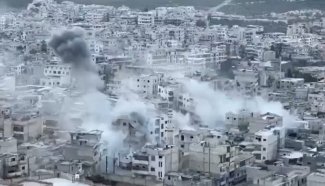Israel attacked

On the morning of 7 October, Hamas – the radical Muslim group that has controlled the Gaza Strip since 2007 – launched a military operation against Israel with rocket attacks and using militias to breach the security barrier in many places and attacked civilians in the border regions. Of the more than 3,000 missiles which targeted towns in the southern and central parts of the country, most were downed and the scale of the losses was small. Nevertheless, armed Palestinian groups invaded more than 20 towns and cities and murdered hundreds of Israeli civilians and uniformed officers, wounded thousands and abducted an unknown number as hostages. On the evening of 8 October, official figures indicated that more than 700 people had been killed, 2,000 wounded and 100 kidnapped; however, this is preliminary information and these figures will inevitably be revised upwards.
The response of the Israeli security structures was slow (there were no troops of sufficient strength nearby), leaving numerous villages under the control of the attackers for many hours. Their liberation continued the following day. On the evening and night of 8 October, there was further rocket fire on central Israel (on a much smaller scale) and anti-Israeli riots in occupied East Jerusalem. In response to the attack, Israel launched a campaign of air strikes against Hamas-linked targets (according to initial information, more than 400 Palestinians were killed, but this number is expected to increase rapidly) and announced a partial mobilisation of reservists. However, the authorities in Jerusalem are still in the process of deciding on what the next steps will be.
Commentary
- The events of 7 October are unprecedented in Israeli history in terms of the scale of the surprise and the number of civilian casualties. In the Israeli domestic debate, they are being compared to the 9/11 attacks in the US – both in terms of the shock caused and the depth of the likely consequences for the state’s internal and external policies.
- The successful ground attack from Gaza is a failure not only of the entire Israeli security apparatus, which did not foresee it and was not prepared to repel it immediately, but above all of the entire state policy towards Hamas which has been conducted since the group took control of the Strip in 2007. It was based on the following assumptions: (1) it is an aggressive organisation, but with limited offensive capabilities; (2) neutralising the threat from it through intelligence activities, defensive measures (air defence, border barrier) and periodic air or air-to-surface operations is cheaper and less risky than trying to overthrow it completely, since this would entail re-occupying the Strip; (3) the political split on the Palestinian side, with Hamas in control of Gaza and the Palestinian Authority structures in control of Palestinian concentrations in the West Bank, is beneficial for Israel as it reduces external pressure regarding the continuation of peace negotiations, to which the Israeli right (dominant on the national political scene continuously since 2009) has had a tangibly negative attitude; (4) with the right economic incentives, Hamas can be discouraged from taking offensive action on a larger scale.
- It is not clear what form the Israeli response will take, but there is no doubt that, in view of the total failure of the modus operandi to date, it will have to be on a much larger scale and with different political objectives than the operations in 2009, 2012, 2014 and 2021. A full-scale ground operation and a renewed occupation of Gaza (or parts of it) therefore seem likely. It would certainly be protracted, risky and entail enormous human losses – primarily among Palestinian civilians, but also on the part of the Israeli armed forces. In addition, it seems that the decision to launch it would require Israel to radically change its approach to the hostage issue. Until now, the state has sought to recover its citizens even at a very high cost (in 2011, it released more than a thousand Palestinian prisoners in exchange for the surrender of one soldier). Now, however, with the number of those abducted and the compulsion to respond quickly and with an impressive show of force – driven by the need to regain credibility in the eyes of its own citizens and to rebuild its external deterrence potential – it will be extremely difficult to maintain this approach.
- The main uncertainty about further developments relates to the regional dimension of the crisis. There are indications that the Hamas attack was carried out with support (in terms of finance, arms and intelligence) from Iran. If it is true that it was inspired by Tehran, it is, however, unclear whether it was planned as an isolated action or as the first act of a wider offensive against Israel. So far, the most important and strongest of the pro-Iranian groups in the region (Lebanon’s Hezbollah) has not joined the confrontation. Nevertheless, it cannot be ruled out that this will happen at a later stage, e.g. after the start of an Israeli ground operation in Gaza. If this scenario were to materialise, and thus a de facto two-front fight were to take place, then the level of threat to Israel’s security would increase dramatically and the conflict would take on a regional character, which would inevitably entail US involvement. So far, the US has pledged political, financial, matériel and deterrence support (on 7 October, President Joe Biden warned regional actors against attempting to join the conflict against Israel).
- Internally, in the short-term the attack strengthens Prime Minister Benjamin Netanyahu’s position as he is leading the response to the threat. The leaders of the parliamentary opposition (contrary to earlier declarations ruling out the possibility of cooperation with Netanyahu) have come forward with a proposal to join a crisis cabinet of national unity, while the leaders of the mass anti-government protests that have been ongoing since the beginning of the year have announced their suspension. At the same time, however, the strengthening of the prime minister’s position will be temporary, as in the longer term he will not escape accusations of political responsibility for the 7 October disaster. Both for the state of the country on the day it happened and the fact that it was unprepared and weakened due to the escalation of internal conflicts, and because of several years of misguided policy towards Gaza and the Palestinian cause in general.
- The reasons why Hamas decided to carry out the attack at this time and in this form (aware of the inevitability of Israeli retaliation) remain unclear, including, it seems, to the Israeli security apparatus. A number of hypothetical factors can be mentioned in this context, but it is unclear which were primary and decisive and which were merely side factors. According to various interpretations, the attack was aimed at: (1) halting the process of normalisation of Israel’s relations with the Arab states and consequently to prevent the marginalisation of the Palestinian cause and the loss of the opportunity for its own statehood; (2) Hamas presenting itself as the most effective Palestinian political force and therefore also the natural and sole contender to take over the West Bank; (3) taking revenge for the actions of Jewish nationalists who undermined the Muslim character of the Al-Aqsa Mosque compound in Jerusalem; (4) coercing Israel into releasing Palestinian prisoners; (5) undermining the sense of security of Israeli citizens and their belief in the sustainability and effectiveness of their state (the attack occurred on the 50th anniversary of the Yom Kippur War). None of these hypotheses, however, convincingly explains the scale of the attack, its enormous brutality and – de facto – the enormous risk the Hamas leadership chose to take, given the inevitability of Israeli retaliation that could lead to the organisation being dismantled or extremely weakened.
- If further developments are limited to a confrontation between Israel and Hamas in the Gaza Strip, the authorities in Jerusalem would manage to respond to the crisis with their own resources with only occasional US political and equipment support. However, if it were to escalate regionally, this would inevitably lead to the redirection of some of the US potential (public and policymaker attention, political, financial, equipment and military resources) from support for Ukraine to support for Israel, especially as the security of that state is a topic that resonates incomparably more strongly in the US domestic debate and is thus also more present in the presidential election campaign. To a lesser extent, this applies to Western European states, especially Germany, which consistently declares that “Israel’s security is part of Germany’s raison d’état”. A regional escalation would therefore clearly be in Russia’s favour, not least because its military presence in Syria could be an effective bargaining chip to use vis-à-vis Israel and the US in this situation.




